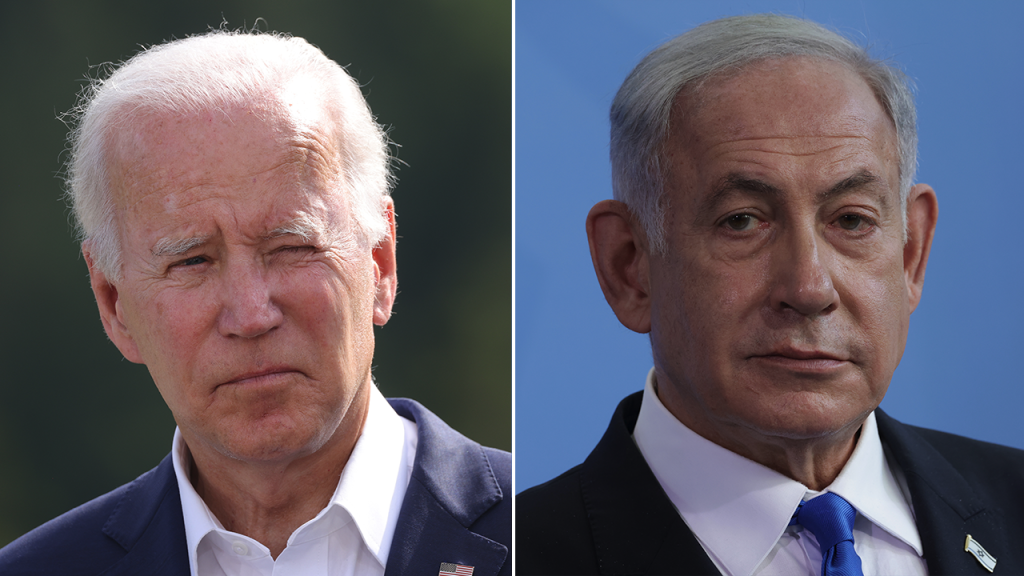President Biden recently criticized Israeli Prime Minister Benjamin Netanyahu for his handling of the conflict between Israel and Hamas. In an interview with Spanish language broadcaster Univision, Biden expressed concern over Netanyahu’s focus on political survival rather than the national interest of his people. The President stated that he does not agree with Netanyahu’s approach to the situation. This criticism comes as Israel faces mounting backlash for its military offensive in the Gaza Strip, especially following the deaths of World Central Kitchen workers in Gaza due to Israeli airstrikes.
Democrats have been calling on Biden to take a stronger stance against Israel and to withhold arms unless the country takes measures to limit civilian casualties. Senate Majority Leader Chuck Schumer has even called for new elections in Israel. During the interview, Biden urged Israel to work towards a ceasefire and provide total access to food and medicine for the people in Gaza. He also mentioned speaking with various regional leaders who are prepared to assist in providing aid to the region. The President’s comments align with the demands of progressives who have accused Israel of committing genocide against Palestinians in Gaza.
Progressives have been urging voters to cast “protest ballots” instead of supporting Biden due to his perceived lack of action on the Israel-Palestine conflict. However, Defense Secretary Lloyd Austin recently stated that there is no evidence of genocide being committed by Israel. This assertion came in response to inquiries from Senator Tom Cotton regarding the accusations of genocide in Gaza. Despite the differing opinions within the Democratic Party, it is clear that the situation in the Middle East remains complex and fraught with challenges.
Biden’s criticism of Netanyahu also comes amidst increasing pressure on Israel to halt its military offensive in Gaza and prevent further civilian casualties. The President’s call for a ceasefire and increased access to essential supplies for the people in the region reflects a growing concern for the humanitarian crisis unfolding in Gaza. Biden’s willingness to engage with regional leaders to provide aid demonstrates a commitment to finding peaceful solutions to the conflict and addressing the immediate needs of the affected population. His stance on the issue is likely to shape the future direction of US policy towards Israel and the broader Middle East region.
It is evident that the Israel-Palestine conflict remains a divisive and contentious issue both within the United States and on the international stage. Biden’s criticism of Netanyahu reflects a growing sentiment among Democrats and progressives that a stronger stance is needed to address the ongoing crisis. The President’s call for a ceasefire and increased humanitarian aid to Gaza demonstrates a commitment to prioritizing civilian welfare and working towards a peaceful resolution to the conflict. As tensions continue to escalate in the region, it will be crucial for global leaders to engage in meaningful dialogue and diplomacy to prevent further violence and loss of life in Israel and the Palestinian territories.
In conclusion, President Biden’s recent comments on the Israel-Palestine conflict highlight the complex challenges facing the region and the urgent need for a diplomatic resolution to the crisis. The President’s criticism of Israeli Prime Minister Netanyahu and calls for a ceasefire demonstrate a commitment to addressing the humanitarian crisis in Gaza and promoting peace in the region. As the situation continues to evolve, it is essential for global leaders to work together towards finding a sustainable solution that ensures the safety and well-being of all those affected by the conflict. The path towards peace in the Middle East remains uncertain, but Biden’s willingness to engage with regional leaders and push for humanitarian aid offers a glimmer of hope for a more peaceful and stable future in the region.


